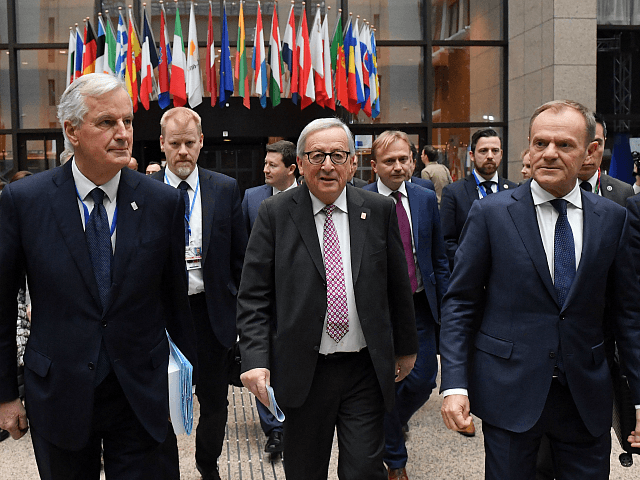Senior EU officials have reportedly said they would only accept a long delay to Brexit if the UK uses the time to decide between cancelling Brexit, agreeing a softer exit — staying in the Single Market and Customs Union — or calling a second referendum.
The report by The Times follows the House of Commons vote Thursday night to back applying to Brussels for a Brexit delay after having voted to rule out leaving without a deal on Wednesday.
Should Prime Minister Theresa May’s Withdrawal Agreement be supported in a third vote set to be held on March 18th or 19th — just over a week before the UK is scheduled, legally, to leave the bloc — she will seek a short extension to June 30th.
If the agreement is voted down again, Mrs May is set to request a longer delay of between one to two years. Any request for extension must be agreed unanimously by the other 27 EU member states’ leaders in the European Council.
After last night’s vote, European Council President Donald Tusk, who supports a second referendum, said he would appeal to EU leaders “to be open to a long extension if the UK finds it necessary to rethink its Brexit strategy and build consensus around it.”
The newspaper’s sources say that the prime minister has been told by EU leaders and Brussels bureaucrats, including Commission president Jean-Claude Juncker, of the conditions, with one diplomat telling The Times, “It will be space for Britain to reflect. It will not be the EU ordering a second referendum. That will not work, it has to be a British choice.”
Not all Eurocrats are open to offering a delay, even in hopes of keeping the UK closely aligned to the EU or of seeing Brexit reversed altogether, with progressive-liberal Brexit coordinator for the European Parliament Guy Verhofstadt saying that the UK should not be allowed to extend Article 50.
“Why should [the European Council] allow an extension, if the UK government and her majority in the House of Commons are not ready for a cross-party approach to break the current deadlock?” Mr Verhofstadt said last night.
“Under no circumstances an extension in the dark!” he said earlier on Thursday. “Unless there is a clear majority in the House of Commons for something precise, there is no reason at all for the European Council to agree on a prolongation. Even the motion tabled for this evening by the UK Government recognises this.”
EU leaders have varying opinions on the notion of extending Article 50, with Germany’s Chancellor Angela Merkel open to the prospect while French President Emmanuel Macron is largely against it, unless under certain conditions.
Ireland’s Taoiseach Leo Varadkar has said Britain could forget all about chasing Brexit “unicorns” and be welcomed back to the European family “with open arms” like a “Prodigal Son returning,” the Dutch have said they will “look with benevolence” at requests for an extension, while the Czechs have also said a second referendum should not be ruled out.
However, the Poles have warned of the “humiliation” of failing to follow through on delivering the will of the people who voted in the majority to leave the EU in June 2016.
Ryszard Legutko MEP, from the country’s governing conservative Law and Justice party, said, “The British people have decided the UK should leave, it should be concluded. Otherwise it would be a humiliation.”
“A second referendum or too long an extension would also be a humiliation,” Mr Legutko added.
A snap poll of Britons hours before the Parliamentary vote to authorise a request to extend Article 50 found a majority were against a Brexit delay, with the House of Commons voting to back the Government motion to postpone Brexit 412 to 202.
In reaction to the House voting to take a clean, no deal Brexit off the table on Wednesday night, Brexit campaigner Nigel Farage declared that “Parliament no longer represents the people,” later writing that “the vote in Parliament to take no deal off the table proves that, 20 months ago, I was right” when he stated, “The great Brexit betrayal has begun.”

COMMENTS
Please let us know if you're having issues with commenting.